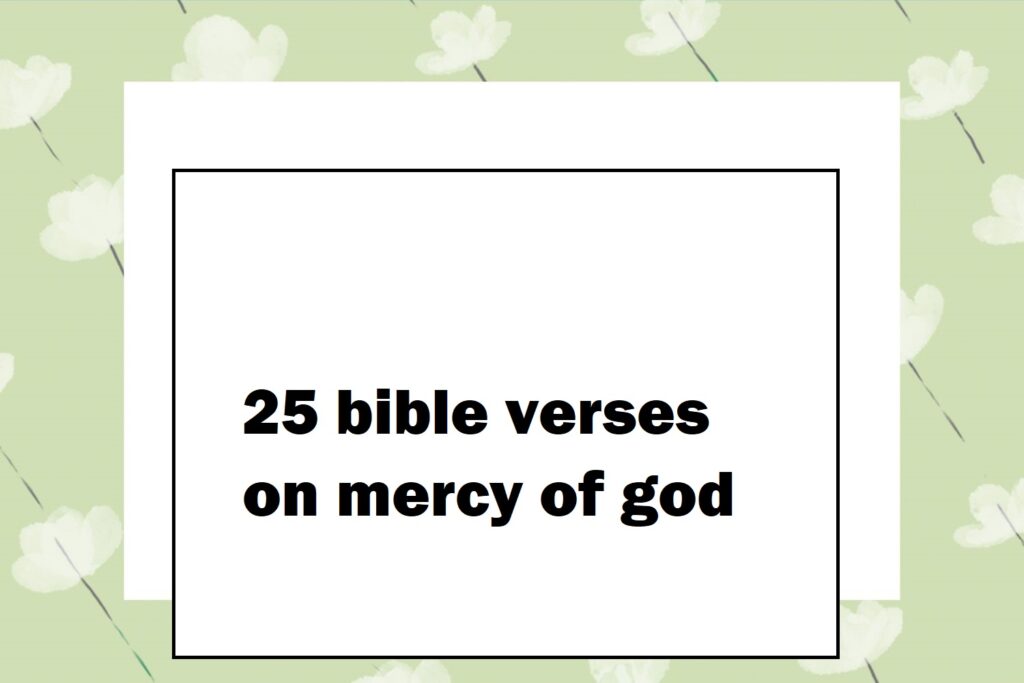The mercy of God stands as one of the most profound and comforting truths in all of Scripture. When life feels overwhelming, when mistakes weigh heavy on our hearts, or when we simply need a reminder of divine love, these verses become anchors for the soul.
God’s mercy isn’t just a theological concept—it’s a living reality that transforms lives daily. The Bible reveals mercy as more than mere forgiveness; it’s God’s compassion in action, His steadfast love that never fails, and His grace that covers every sin and shortcoming.
From the unfailing love described in the Psalms to the tender mercies proclaimed by the prophets, Scripture paints a beautiful picture of a God whose compassion knows no bounds. These verses remind us that divine mercy triumphs over judgment, that God’s kindness leads us to repentance, and that His enduring love provides hope for every believer.
God’s Character: The Foundation of Divine Mercy
Understanding God’s mercy begins with recognizing it as an essential part of His divine nature. These verses reveal that mercy isn’t something God occasionally shows—it’s who He is.
1. Exodus 34:6-7
“And he passed in front of Moses, proclaiming, ‘The Lord, the Lord, the compassionate and gracious God, slow to anger, abounding in love and faithfulness, maintaining love to thousands, and forgiving wickedness, rebellion and sin.'”
This foundational declaration reveals God’s character as inherently merciful. The Hebrew word for compassion here suggests deep, womb-like love—the kind of protective, nurturing care a mother has for her child. When we understand that God’s mercy flows from His very essence, we can approach Him with confidence, knowing His faithfulness never wavers.
2. Psalm 103:8
“The Lord is compassionate and gracious, slow to anger, abounding in love.”
David understood that God’s patience isn’t weakness but strength under control. This verse reminds us that when we fail, God’s love doesn’t diminish. His slow to anger nature gives us time to repent and return to Him, while His abundant love ensures we’re never beyond His reach.
3. Lamentations 3:22-23
“Because of the Lord’s great love we are not consumed, for his compassions never fail. They are new every morning; great is your faithfulness.”
Even in the darkest circumstances, God’s compassion provides fresh hope. The phrase “new every morning” suggests that His mercy isn’t recycled or diminished by use—it’s continuously renewed. This divine attribute means yesterday’s failures don’t determine today’s potential for grace.
4. Psalm 136:1
“Give thanks to the Lord, for he is good. His love endures forever.”
The repetition of “His love endures forever” throughout Psalm 136 emphasizes the eternal nature of God’s mercy. This enduring love isn’t temporary or conditional—it’s an unchanging aspect of who God is. When circumstances change, His steadfast love remains constant.
5. Nehemiah 9:17
“But you are a forgiving God, gracious and compassionate, slow to anger and abounding in love. Therefore you did not desert them.”
Nehemiah recognized that even when Israel repeatedly failed, God’s mercy prevented abandonment. This verse teaches us that divine forgiveness isn’t earned but flows from God’s gracious nature. His compassion ensures He never gives up on His people.
Experiencing God’s Mercy in Times of Need
Life’s challenges often become the backdrop where God’s mercy shines brightest. These verses speak to those moments when we desperately need divine intervention and comfort.
6. Psalm 51:1
“Have mercy on me, O God, according to your unfailing love; according to your great compassion blot out my transgressions.”
David’s prayer after his sin with Bathsheba demonstrates how to approach God for mercy. He doesn’t minimize his sin or make excuses—he appeals directly to God’s unfailing love and great compassion. This teaches us that confession opens the door to experiencing divine mercy fully.
7. Hebrews 4:16
“Let us then approach God’s throne of grace with confidence, so that we may receive mercy and find grace to help us in our time of need.”
Paul reminds us that God’s throne isn’t one of judgment for believers but of grace. We can approach with confidence because Christ’s work guarantees our welcome. This verse transforms prayer from fearful pleading to confident conversation with a merciful Father.
8. Psalm 30:5
“For his anger lasts only a moment, but his favor lasts a lifetime; weeping may stay for the night, but rejoicing comes in the morning.”
This verse provides perspective during difficult seasons. While God’s justice may require discipline, His mercy ensures it’s temporary. The promise of morning joy reminds us that current struggles aren’t permanent—God’s favor will ultimately prevail.
9. Isaiah 55:7
“Let the wicked forsake their ways and the unrighteous their thoughts. Let them turn to the Lord, and he will have mercy on them, and to our God, for he will freely pardon.”
Isaiah emphasizes that God’s mercy is available to everyone willing to repent. The phrase “freely pardon” indicates that forgiveness isn’t earned through good works but received through divine grace. This verse offers hope to those who feel their sins are too great for God’s mercy.
10. Micah 7:18-19
“Who is a God like you, who pardons sin and forgives the transgression of the remnant of his inheritance? You do not stay angry forever but delight in mercy. You will again have compassion on us; you will tread our sins underfoot and hurl all our iniquities into the depths of the sea.”
Micah marvels at God’s unique character—unlike human anger that often lingers, God delights in mercy. The imagery of sins being hurled into the sea’s depths assures us that divine forgiveness is complete and irreversible. When God forgives, He doesn’t keep a record for future reference.
Mercy Through Christ: The Ultimate Expression
Jesus Christ represents the pinnacle of God’s mercy. Through His life, death, and resurrection, we see divine compassion in its fullest expression.
11. Ephesians 2:4-5
“But because of his great love for us, God, who is rich in mercy, made us alive with Christ even when we were dead in transgressions—it is by grace you have been saved.”
Paul explains that salvation flows from God’s rich mercy. The phrase “even when we were dead” emphasizes that God’s love reached us before we could respond. This mercy doesn’t wait for us to clean up our lives—it meets us in our spiritual deadness and brings new life.
12. Titus 3:5
“He saved us through the washing of rebirth and renewal by the Holy Spirit, not because of righteous things we had done, but because of his mercy.”
This verse clarifies that salvation isn’t a reward for good behavior but a gift of mercy. The “washing of rebirth” speaks to complete spiritual renewal—not just forgiveness but transformation. God’s mercy doesn’t just cover our past; it creates our future.
13. 1 Peter 1:3
“Praise be to the God and Father of our Lord Jesus Christ! In his great mercy he has given us new birth into a living hope through the resurrection of Jesus Christ from the dead.”
Peter connects God’s great mercy directly to Christ’s resurrection. This “living hope” isn’t wishful thinking but confident expectation based on Christ’s victory over death. God’s mercy through Jesus guarantees our eternal future while transforming our present reality.
14. Romans 9:15-16
“For he says to Moses, ‘I will have mercy on whom I have mercy, and I will have compassion on whom I have compassion.’ It does not, therefore, depend on human desire or effort, but on God’s mercy.”
Paul reminds us that mercy is entirely God’s prerogative—not something we can earn or manipulate. This truth both humbles us and comforts us. We can’t demand mercy, but we can trust that God’s compassion flows from His perfect wisdom and love.
15. Luke 1:78-79
“Because of the tender mercy of our God, by which the rising sun will come to us from heaven to shine on those living in darkness and in the shadow of death, to guide our feet into the path of peace.”
Zechariah’s prophecy about John the Baptist and Jesus describes God’s mercy as a rising sun piercing darkness. This imagery suggests that divine mercy doesn’t just forgive—it illuminates, guides, and leads to peace. Christ as the “rising sun” brings both salvation and direction for life.
Mercy in Action: How God’s People Should Respond
Receiving God’s mercy naturally leads to extending mercy to others. These verses show how divine compassion should flow through us to transform relationships and communities.
16. Matthew 5:7
“Blessed are the merciful, for they will be shown mercy.”
Jesus’ beatitude establishes a principle: mercy received should produce mercy given. This isn’t earning God’s mercy through good works but demonstrating its reality in our lives. When we show compassion to others, we reflect God’s character and position ourselves to continue receiving His grace.
17. Colossians 3:12
“Therefore, as God’s chosen people, holy and dearly loved, clothe yourselves with compassion, kindness, humility, gentleness and patience.”
Paul uses clothing imagery to describe how believers should demonstrate God’s mercy. Just as we dress our bodies, we must intentionally “wear” compassion and kindness. This daily choice to show mercy reflects our identity as God’s chosen people who have experienced His love.
18. James 2:13
“Because judgment without mercy will be shown to anyone who has not been merciful. Mercy triumphs over judgment.”
James warns that those who refuse to show mercy shouldn’t expect to receive it. However, the phrase “mercy triumphs over judgment” offers hope—God’s compassion is stronger than His justice. When we extend mercy to others, we align ourselves with God’s victorious love.
19. Micah 6:8
“He has shown you, O mortal, what is good. And what does the Lord require of you? To act justly and to love mercy and to walk humbly with your God.”
Micah identifies three essential requirements for godly living: justice, love of mercy, and humility. Loving mercy means more than receiving it—it means delighting in opportunities to show compassion to others. This verse challenges us to make mercy a central value, not just a occasional action.
20. Luke 6:36
“Be merciful, just as your Father is merciful.”
Jesus calls His followers to mirror God’s merciful character. The standard isn’t human compassion but divine mercy. This seems impossible until we remember that God’s Spirit within us enables such love. As we grow in understanding God’s mercy toward us, we become more capable of extending it to others.
The Eternal Perspective: Mercy’s Ultimate Victory
These final verses remind us that God’s mercy extends beyond this life into eternity, offering hope that transcends all earthly circumstances.
21. Psalm 23:6
“Surely your goodness and love will follow me all the days of my life, and I will dwell in the house of the Lord forever.”
David’s confidence wasn’t based on his own righteousness but on God’s pursuing love. The word “follow” suggests active pursuit—God’s mercy doesn’t wait for us to seek it but actively chases us. This divine pursuit continues through life and into eternity, where we’ll experience perfect fellowship with our merciful God.
22. Jude 1:21
“Keep yourselves in God’s love as you wait for the mercy of our Lord Jesus Christ to bring you to eternal life.”
Jude encourages believers to remain in God’s love while anticipating Christ’s mercy leading to eternal life. This verse shows that mercy isn’t just about forgiveness from past sins but about future hope. Jesus’ mercy guarantees not just salvation but eternal fellowship with God.
23. 1 Peter 2:10
“Once you were not a people, but now you are the people of God; once you had not received mercy, but now you have received mercy.”
Peter emphasizes the transformative power of God’s mercy. It doesn’t just change our eternal destination—it changes our identity. We become “the people of God” not through achievement but through mercy received. This new identity should shape how we live and relate to others.
24. Psalm 118:1-4
“Give thanks to the Lord, for he is good; his love endures forever. Let Israel say: ‘His love endures forever.’ Let the house of Aaron say: ‘His love endures forever.’ Let those who fear the Lord say: ‘His love endures forever.'”
This psalm emphasizes the universal and eternal nature of God’s love. The repetition of “His love endures forever” reminds all people—Israel, priests, and believers—that divine mercy transcends time and circumstance. This enduring love provides confidence for facing any challenge.
25. Revelation 4:8
“Each of the four living creatures had six wings and was covered with eyes all around, even under its wings. Day and night they never stop saying: ‘Holy, holy, holy is the Lord God Almighty, who was, and is, and is to come.'”
While this verse emphasizes God’s holiness, it provides context for His mercy. The Holy God who deserves perfect righteousness chooses to show mercy to imperfect people. Understanding God’s holiness makes His mercy even more remarkable and precious. In eternity, we’ll worship a God whose holiness and mercy perfectly coexist.
Conclusion: Embracing the Life-Changing Power of God’s Mercy
These 25 Bible verses reveal that God’s mercy isn’t just a theological doctrine but a living reality that transforms lives. From Moses’ encounter with God’s proclaimed character to John’s vision of eternal worship, Scripture consistently presents a God whose mercy defines His relationship with humanity.
God’s mercy offers hope to the guilty, comfort to the suffering, and direction to the lost. It changes our past through forgiveness, transforms our present through grace, and secures our future through salvation. When we truly grasp the depth of divine mercy, it naturally flows through us to others, creating communities marked by compassion and love.
Remember that God’s mercy is both a gift to receive and a character trait to develop. As you meditate on these verses, allow them to deepen your gratitude for God’s unfailing love while inspiring you to extend that same mercy to others. In a world often marked by judgment and harshness, believers have the privilege of demonstrating God’s merciful character.
Let these verses remind you daily that no mistake is too great for God’s mercy, no situation too hopeless for His intervention, and no person too far from His redemptive love. God’s mercy truly does triumph, and in that truth, we find both peace and purpose.
Practical Ways to Apply These Mercy Verses
Daily Meditation and Prayer
- Choose one verse each week for focused meditation, allowing its truth to shape your perspective
- Create a mercy prayer list of people who need God’s compassion, including yourself
- Start each morning by reading one of these verses aloud, personalizing it with your name
Sharing God’s Mercy with Others
- Memorize key verses like Lamentations 3:22-23 or Ephesians 2:4-5 to share during conversations
- Write these verses in cards for friends going through difficult times
- Use social media to share weekly mercy verses with encouraging personal reflections
Building a Mercy-Centered Life
- Practice the “mercy pause” before responding to others’ mistakes or failures
- Keep a mercy journal recording how you’ve experienced and extended God’s compassion
- Study the lives of biblical figures mentioned in these verses to see mercy in action
Family and Community Application
- Teach children simple mercy verses like Psalm 103:8, explaining God’s love in age-appropriate ways
- Organize small group studies focusing on God’s merciful character using these verses
- Create mercy moments in family devotions, sharing examples of giving and receiving compassion
Frequently Asked Questions
What’s the difference between God’s mercy and His grace?
Mercy is God not giving us the punishment we deserve, while grace is God giving us the blessings we don’t deserve. Mercy withholds judgment; grace bestows favor. Both flow from God’s love and work together in our salvation and daily relationship with Him.
How can I experience more of God’s mercy in my daily life?
God’s mercy is always available, but we experience it more fully through confession, humility, and faith. Regular prayer, Scripture reading, and fellowship with other believers help us recognize and receive God’s daily mercies. Remember that His compassions are new every morning.
Does God’s mercy mean He overlooks sin?
God’s mercy doesn’t ignore sin but provides a way to deal with it through Christ’s sacrifice. Divine mercy upholds justice while offering forgiveness. God takes sin seriously—seriously enough to send Jesus to pay its penalty—but His mercy ensures that repentant hearts find complete pardon.
How should I respond when others don’t show me mercy?
While we can’t control others’ responses, we can choose to reflect God’s merciful character regardless. Jesus taught us to forgive as we’ve been forgiven. This doesn’t mean accepting abuse or avoiding boundaries, but it means releasing bitterness and seeking reconciliation when possible.
Can I lose God’s mercy through my failures?
God’s mercy isn’t dependent on your performance but on His unchanging character. While sin can affect your fellowship with God and create consequences, it doesn’t eliminate His mercy toward you. Confession and repentance restore intimacy, but God’s merciful heart toward His children never changes.
How do I show mercy to someone who has hurt me deeply?
Showing mercy to those who’ve caused deep pain often requires time and God’s help. Start by praying for them and asking God to heal your heart. Forgiveness is a process, not a one-time event. Remember that mercy doesn’t require ignoring justice or removing all consequences—it means releasing your right to revenge and seeking the person’s redemption.

Catherine Frank, founder of BiblicalHorizon.com, shares daily prayers and Bible verses to nurture spiritual growth. With a lifelong passion for scripture and prayer traditions, she creates accessible spiritual content that resonates with both seasoned believers and newcomers seeking divine connection.



